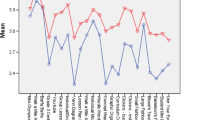Abstract
The use of study questions to guide student learning and in-class discussion is presented as an alternative to the traditional methods of instruction in social work which rely upon formal lectures, and mid-term and final examinations and term papers to motivate studying. The positive results of two separate investigations on the value of study questions is described, and the instructional technique is suggested as worthy of consideration by social work educators.
Similar content being viewed by others
References
Barlow, D.H. & Hersen, M. (1984).Single-case Experimental Designs. New York: Pergamon.
Brophy, J. (1986). Teacher influences on student achievement.American Psychologist, 41, 1069–1077.
Campbell, D.T. & Stanley, J.C. (1963).Experimental and Quasi-Experimental Designs for Research. Chicago, IL: Rand McNally.
Cook, T.D. & Campbell, D.T. (1979).Quasi-Experimentation: Design and Analysis Issues for Field Settings. Chicago, IL: Rand McNally.
Council on Social Work Education. (1982). Curriculum policy for the Master's degree and Baccalaureate degree programs in social work education.Social Work Education Reporter, 30(3), 5–12.
Frankel, B.L., Cohen-Cole, S.A., Milne, J., Schubert, D.S., & Muskin, P.R. (1986). A pilot program for assigned readings by residents in consultation psychiatry.Psychosomatics, 27, 644–647.
Grinnell, R.M. (Ed.), (1988).Social Work Research and Evaluation (third edition). Itasca, IL: Peacock.
Kilpatrick, A.C., Thompson, K.H., Jarrett, H.H. & Anderson, R. J. (1984). The andragogical model in social work education. In M.S. Knowles (Ed.).Andragogy in Action. San Francisco: Jossey-Bass.
Knowles, M.S. (ed.). (1984).Andragogy in Action. San Francisco: Jossey-Bass.
National Association of Social Workers. (1980).Code of Ethics. Silver Spring, MD: Author.
National Association of Social Workers. (1984).NASW Standards for the Practice of Clinical Social Work. Silver Spring, MD: Author.
Pryor, K. (1984).Don't Shoot the Dog: The New Art of Teaching and Training. New York: Bantam.
Schinke, S.P. et al. (1988). Preventing substance abuse among American-Indian adolescents.Journal of Counseling Psychology, 35, 87–90.
Skinner, B.F. (1974).About Behaviorism. New York: Knopf.
Sowers-Hoag, K.M. & Thyer, B.A. (1985). Teaching social work practice: A review and analysis of empirical research.Journal of Social Work Education, 21(3), 5–15.
Thomas, M.H. & Dieter, J.N. (1987). The positive effects of writing practice on integration of foreign words in memory.Journal of Educational Psychology, 79, 249–253.
Thyer, B.A. (1988). Teaching without testing: A preliminary report of an innovative technique for social work education.Innovative Higher Education, 13, 47–53.
Tobias, S. (1987). Mandatory text review and interaction with student characteristics.Journal of Educational Psychology, 79, 154–161.
Whaley, D.L. & Malott, R.W. (1971).Elementary Principles of Behavior. Englewood Cliffs, NJ: Prentice-Hall.
Wodarski, J.S. (1985).Introduction to Human Behavior. Austin, TX: Pro-Ed.
Wodarski, J.S., Thyer, B.A., Iodice, J.D. & Pinkston, R.H. (in press). Graduate social work education: A review of empirical research.Journal of Social Service Research.
Author information
Authors and Affiliations
Additional information
Bruce A. Thyer, Ph.D., is an Associate Professor of Social Work with the University of Georgia, and an Associate Clinical Professor with the Department of Psychiatry and Health Behavior at the Medical College of Georgia. Dr. Thyer's research interests involve applied behavior analysis within social work practice.
Richard Sutphen, M.S.W., received his masters degree from the University of Georgia in 1989. Mr. Sutphen is currently the Research Project Coordinator for a study on the treatment of black offenders in the Georgia Juvenile Justice System, conducted through the University of Georgia School of Social Work.
Karen M. Sowers-Hoag, Ph.D., received her doctorate in social work from Florida State University in 1987. She is currently an Assistant Professor with the Department of Social Work at Florida International University, where her research interests are divided between the fields of child welfare, and social work education.
Rights and permissions
About this article
Cite this article
Thyer, B.A., Sutphen, R. & Sowers-Hoag, K.M. Using structured study questions as a teaching method in social work education: Initial validation studies. Innov High Educ 14, 155–164 (1990). https://doi.org/10.1007/BF00889616
Issue Date:
DOI: https://doi.org/10.1007/BF00889616




